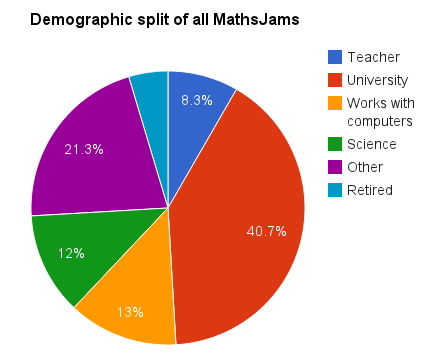Those of you with long, long memories (and who attend a MathsJam) may recall that back in November 2012, MathsJam HQ sent out a questionnaire to monthly regional meetups, with various questions about attendance and ping-pong balls. The purpose of the survey was to get a snapshot of what the monthly MathsJams are like, as well as to produce some spurious graphs. Christian and I, who run the Newcastle and Manchester MathsJams respectively, were tasked with analysing the data. Here are our findings!
MathsJam November Inventory (Novemtory) Data
Age
We asked each MathsJam to provide an indication of the ages of the attendees – using whichever method they like, since we’re aware not everyone is willing to divulge this information. Some MathsJams, particularly those with lower attendance, were happy to give exact values, while others used clever methods to determine the average age without anyone having to give their own age.
As an example, the London MathsJam used a random seed to keep it all secret – the first person obtained a random number, and added it to their age. This total was passed quietly along the line of attendees, each of whom added their own age and passed on the new total. The final total was given back to the first person, who could subtract their random seed and divide the result by the number of people to obtain an average age.
- Average age of a MathsJam attendee: 32.37
- Estimated total age of all MathsJam attendees: 3398.4 years
Occupation
We’re interested to know what type of people attend a MathsJam – while it’s known that some teachers enjoy coming for the opportunity to share things they can use for classroom enrichment (and others like to get away from work, and remind themselves why they enjoy the subject!), we also wonder if the presence of a strong university-based contingent can affect the feel of the event. We also know some people who work in less mathematical careers might attend in order to indulge their hobby, while others who trained in maths but don’t get to use it any more will love being reminded of nice maths.
The results of this snapshot (admittedly only for one month’s attendance, and across the MathsJams which replied – 17 out of roughly 30 existing Jams), provides some surprising figures. We grouped the job titles given into categories, with anyone who’s a student or lecturer at a university in the same category, and IT/computing/developer jobs clumped together, while ‘science’ covers anyone in a technical or research role; this may contain people who should be in the ‘university’ category, but they weren’t specific enough.
Rough Demographic Breakdown of MathsJams:
| Teacher | 8.33% |
| University | 40.74% |
| Works with computers | 12.96% |
| Science | 12.04% |
| Other | 21.30% |
| Retired | 4.63% |
Those Data Again As A Pie Chart, because Pie Chart:

Reminder Emails
Out of sheer curiosity, we investigated how well the MathsJam organisers are remembering to send their reminder emails before each event. In the previous sentence, read ‘sheer curiosity’ as ‘wanting to know if we’re more or less organised than the average’. It would be interesting to investigate how promptness or otherwise of reminder emails impacts on attendance vs. average attendance, but we considered this dataset too small to be able to draw meaningful conclusions. Again, this is from the ones that replied.
- Average number of days before the MathsJam that a reminder email gets sent: 4.16
- MathsJam with highest average value: Nottingham; 6.33 days
- MathsJam with lowest average value: Edinburgh; 1 day (they literally always send it the day before, which is probably fine)
And the one you really want to know:
- MathsJam with highest standard deviation: Liverpool: 2.83 (tie for second place between Cardiff and Nottingham).
Attendance
Since we asked for the month each MathsJam started meeting, we could calculate the total number of monthly MathsJam meetings that have taken place ever, which we got as 272. This doesn’t include the MathsJams that didn’t reply, so the true total will be much higher, but there have been a few cancellations due to weather/organiser availability, which will bring it down a bit. We also calculated the average attendance – it turns out that November was pretty much exactly an average month, with 105 total attendees reported over all replying Jams, compared to a total average attendance of 104. For sheer stupidity, the estimated total number of occasions on which a person has attended a MathsJam (again, missing a lot of data).
- Mean monthly MathsJam attendance: 7.9 people
- Total number of Person-Jams: 2151
Gender
Even though mathematics as a subject is male-dominated, we’d hope that we’re a welcoming organisation and would maintain a relatively equitable gender split across MathsJammeurs and MathsJammeuses. We were pleased to note that we’re not totally overrun by gentlemen, and only two MathsJams (both small ones) reported a total absence of ladies.
- Mean gender split: 66% male (mean average)
- Lady-est MathsJam: Milton Keynes (although this was caused by a November attendance of 1 male and 2 females).
And for fans of conditional probability:
- $P(\text{You’re a man} \;|\; \text{You attend MathsJam}) = 65.71\%$
Daft Questions
We ended the questionnaire with some questions to get the attendees thinking, including one about the number of ping-pong balls that could fit in the pub (answers varied from ‘one big one’ to Portsmouth’s probably overly specific 27216000.5). We also asked MathsJams to estimate the number of dominoes in this bag:

- Correctest answer to the ‘bag of dominoes’ question: 253 (Newcastle – answer was obtained by averaging the guesses of all attendees)
- Wrongest answer to the ‘bag of dominoes’ question: 850 (London)
- Actual number of dominoes that were in that bag: 254
- Amount that we are suspicious of Newcastle MathsJam: a lot
Time
We also asked for approximate start and end times for each MathsJam, for three reasons: 1. to check there’s some kind of consistency in start times; 2. to make sure what it says on the MathsJam website is correct; and 3. to see who is the most hardcore. In acknowledgement of the fact that having two people in the pub doesn’t lend itself to a long session like having 20 people does, we’ve weighted the below based on the number of people who attended. London MathsJam, being the oldest and most well-established, scored both highest attendance and longest session, clocking in at 4 hours 24 minutes with 21 people. Most MathsJams begin at 7pm, with a few starting at 7.30pm, and the average finish time is 10.09pm.
Average time spent jamming: 3 hours 25 minutes (weighted for number of attendees, assuming everyone’s there at the start).
Nottingham’s answer to the “number of dominoes in a bag” question is probably a good example of the wisdom of the crowd. Each attendant may be far off, but analysing the data and choosing the most sensible average may give a result scarily close to the actual answer.
Do you mean Newcastle’s answer?